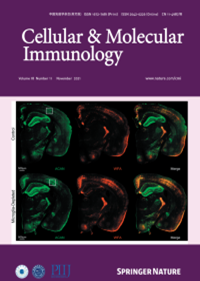Gut-derived macrophages link intestinal damage to brain injury after cardiac arrest through TREM1 signaling
IF 19.8
1区 医学
Q1 IMMUNOLOGY
引用次数: 0
Abstract
Brain injury is the leading cause of death and disability in survivors of cardiac arrest, where neuroinflammation triggered by infiltrating macrophages plays a pivotal role. Here, we seek to elucidate the origin of macrophages infiltrating the brain and their mechanism of action after cardiac arrest/cardiopulmonary resuscitation (CA/CPR). Wild-type or photoconvertible Cd68-Cre:R26-LSL-KikGR mice were subjected to 10-min CA/CPR, and the migration of gut-derived macrophages into brain was assessed. Transcriptome sequencing was performed to identify the key proinflammatory signal of macrophages infiltrating the brain, triggering receptor expressed on myeloid cells 1 (TREM1). Upon drug intervention, the effects of TREM1 on post-CA/CPR brain injury were further evaluated. 16S rRNA sequencing was used to detect gut dysbiosis after CA/CPR. Through photoconversion experiments, we found that small intestine-derived macrophages infiltrated the brain and played a crucial role in triggering secondary brain injury after CA/CPR. The infiltrating peripheral macrophages showed upregulated TREM1 levels, and we further revealed the crucial role of gut-derived TREM1+ macrophages in post-CA/CPR brain injury through a drug intervention targeting TREM1. Moreover, a close correlation between upregulated TREM1 expression and poor neurological outcomes was observed in CA survivors. Mechanistically, CA/CPR caused a substantial expansion of Enterobacter at the early stage, which ignited intestinal TREM1 signaling via the activation of Toll-like receptor 4 on macrophages through the release of lipopolysaccharide. Our findings reveal essential crosstalk between the gut and brain after CA/CPR and underscore the potential of targeting TREM1+ small intestine-derived macrophages as a novel therapeutic strategy for mitigating post-CA/CPR brain injury.

肠源性巨噬细胞通过TREM1信号将心脏骤停后肠道损伤与脑损伤联系起来。
脑损伤是心脏骤停幸存者死亡和残疾的主要原因,其中浸润性巨噬细胞引发的神经炎症起着关键作用。在这里,我们试图阐明巨噬细胞浸润大脑的起源及其在心脏骤停/心肺复苏(CA/CPR)后的作用机制。野生型或光转化型Cd68-Cre:R26-LSL-KikGR小鼠进行10分钟的CA/CPR,评估肠源性巨噬细胞向大脑的迁移。通过转录组测序,鉴定巨噬细胞浸润脑,触发髓样细胞1受体表达(tre1)的关键促炎信号。经药物干预后,进一步评估TREM1对ca /CPR后脑损伤的影响。采用16S rRNA测序检测CA/CPR后肠道生态失调。通过光转化实验,我们发现小肠来源的巨噬细胞浸润大脑,在CA/CPR后继发性脑损伤的触发中起关键作用。浸润的外周巨噬细胞显示TREM1水平上调,我们通过靶向TREM1的药物干预进一步揭示了肠源性TREM1+巨噬细胞在ca /CPR后脑损伤中的重要作用。此外,在CA幸存者中观察到TREM1表达上调与神经预后不良密切相关。机制上,CA/CPR在早期引起肠杆菌大量扩增,通过释放脂多糖激活巨噬细胞上的toll样受体4,从而点燃肠道TREM1信号。我们的研究结果揭示了CA/CPR后肠道和大脑之间必不可少的相互作用,并强调了靶向TREM1+小肠源性巨噬细胞作为减轻CA/CPR后脑损伤的新治疗策略的潜力。
本文章由计算机程序翻译,如有差异,请以英文原文为准。
求助全文
约1分钟内获得全文
求助全文
来源期刊
CiteScore
31.20
自引率
1.20%
发文量
903
审稿时长
1 months
期刊介绍:
Cellular & Molecular Immunology, a monthly journal from the Chinese Society of Immunology and the University of Science and Technology of China, serves as a comprehensive platform covering both basic immunology research and clinical applications. The journal publishes a variety of article types, including Articles, Review Articles, Mini Reviews, and Short Communications, focusing on diverse aspects of cellular and molecular immunology.

 求助内容:
求助内容: 应助结果提醒方式:
应助结果提醒方式:


